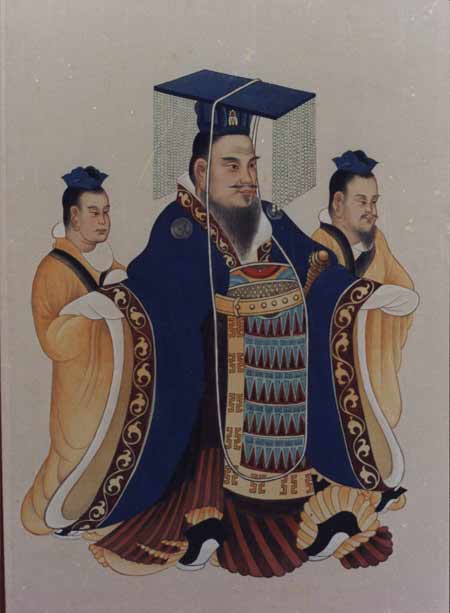Emperor Wu of Han , born Liu Che, courtesy name Tong, was the seventh emperor of the Han dynasty of China, ruling from 141–87 BC. His reign lasted 54 years — a record not broken until the reign of the Kangxi Emperor more than 1,800 years later. His reign resulted in a vast territorial expansion and the development of a strong and centralized state resulting from his governmental reorganization, including his promotion of Confucian doctrines. In the field of historical social and cultural studies, Emperor Wu is known for his religious innovations and patronage of the poetic and musical arts, including development of the Imperial Music Bureau into a prestigious entity. It was also during his reign that cultural contact with western Eurasia was greatly increased, directly and indirectly.
As a military campaigner, Emperor Wu led Han China through its greatest expansion. At its height, the Empire's borders spanned from modern Kyrgyzstan in the west, to Korea in the east, and to northern Vietnam in the south. Emperor Wu successfully repelled the nomadic Xiongnu from systematically raiding northern China, and dispatched his envoy Zhang Qian in 139 BC to seek an alliance with the Yuezhi of Kangju . This resulted in further missions to Central Asia. Although historical records do not describe him as being aware of Buddhism, emphasizing rather his interest in shamanism, the cultural exchanges that occurred as a consequence of these embassies suggest that he received Buddhist statues from Central Asia, as depicted in the murals found in the Mogao Caves.
Emperor Wu is considered one of the greatest emperors in Chinese history, due to his effective governance which made the Han dynasty one of the most powerful nations in the world. Michael Loewe called the reign of Emperor Wu the "high point" of "Modernist" policies, looking back to "adapt ideas from the pre-Han period." His policies and most trusted advisers were Legalist, favouring adherents of Shang Yang. However, despite establishing an autocratic and centralised state, Emperor Wu adopted the principles of Confucianism as the state philosophy and code of ethics for his empire and started a school to teach future administrators the Confucian classics. These reforms had an enduring effect throughout the existence of imperial China and an enormous influence on neighbouring civilizations.
Wikipedia
✵
7. June 156 BC – 29. March 87 BC
